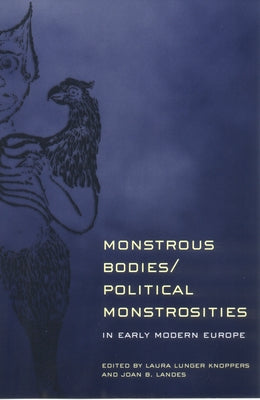Before you leave...
Take 20% off your first order
20% off
Enter the code below at checkout to get 20% off your first order
Discover summer reading lists for all ages & interests!
Find Your Next Read

Multi-disciplinary in approach and cross-European in scope, this richly illustrated book features new links between the political and the monstrous in the early modern period. Emphasizing the importance of the visual in the culture of the monstrous, the book presents a range of striking engravings, woodcuts, broadsides, and anatomical works. Some of the most respected scholars of early modern Europe explore monstrous bodies in descriptions of aberrant births and grotesque anatomies, appropriations of classical or biblical beasts and harlots, satire, myth, and science fiction.Canonical writings on monstrosity by Aristotle, Ambroise Paré, Rabelais, Montaigne, and Mary Shelley are juxtaposed to less familiar treatments by Calvin, Luther, and Andrew Marvell, among others. This volume challenges established narratives in which modern science and medicine, sustained by enlightened reason and secularization, progressively contain and even "normalize" all monsters. Instead, these essays stress the continual reinvention and polemical applications of the monstrous in the early modern period. Monsters emerge as a rich subject for not only the history of science, but also political and religious history, literary studies, visual studies, and the history of popular culture.
Laura Lunger Knoppers is Professor of English and Director, Institute for the Arts and Humanities, The Pennsylvania State University. She is the author of Constructing Cromwell: Ceremony, Portrait, and Print, 1645-1661 and Historicizing Milton: Spectacle, Poetry, and Power in Restoration England and the editor of Puritanism and Its Discontents. Joan B. Landes is Professor of Women's Studies and History at The Pennsylvania State University. She is the author of Visualizing the Nation: Gender, Representation, and Revolution in Eighteenth-Century France; Women and the Public Sphere in the Age of the French Revolution (both from Cornell); and the editor of Feminism, the Public and the Private.
Thanks for subscribing!
This email has been registered!
Take 20% off your first order
Enter the code below at checkout to get 20% off your first order